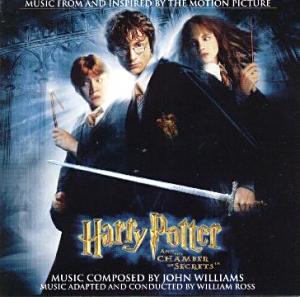************************************************************** EDITOR’s RECOMMENDATION December 2002 **************************************************************
John WILLIAMS
Harry Potter and the Chamber of Secrets
(Music from and inspired by the movie adapted and conducted by William ROSS); performed by the London Symphony Orchestra and London Voices
WARNER/NONESUCH/ATLANTIC 7567-93159-5 2 CDS (one CD-ROM) [70:17]
BUY NOW

As might be expected the themes established for the first Harry Potter film, released last year, are elaborated here. It is by no means clear from the booklet, the detail of the collaboration of Williams and Ross i.e. the 'adaptation', save that as an inside footnote states: "all music composed by John Williams". And it is certainly, and consistently, the sound world of John Williams, so whatever creative work Ross has contributed is quite seamless.
Once again the full resources of an enlarged London Symphony Orchestra are unleashed.
The opening bars of the Prologue is a reprise of the Harry Potter theme on celeste with the sort of broomstick string flourishes and woodwind grotesques etc. Much of the material is reminiscent of Williams's earlier fantasy and Sci-Fi scores, but at the risk of repeating myself from earlier Williams reviews, it is all put together with such charm and skill, with such colourful orchestrations and clever harmonies that criticism is largely disarmed. The second track 'Fawkes the Phoenix' is a most attractive melody and soars exhilaratingly. 'Gilderoy Lockhart' is a pompous, ironic lampoon, 'The Flying Car' swerves, dips and dodges at break-neck speed - in part, a sort of E.T. meets Danny Elfman's Edward Scissorhands chorus.
'Knockturn Alley', after subterranean rumblings, emerges as a sort of medieval pastiche with bells and tambourines before the music turns warm and nostalgic. 'Introducing Colin' is playful and innocent with a coyness that shows at one point a chilling edge. 'Dobby the House Elf' is one of those endearing Williams's caricatures for the spindly-legged little fellow with big eyes and floppy ears: Williams captures his gait; he appears cautious but sprightly, ponderous but loveable; and there is something about him that suggests the oriental. The 'Spiders' are suitably creepy and chilling, nice use of divided strings and string effects, and colourful percussion. 'Moaning Myrtle' is a ghostly apparition with spectral, wind-blown women's voices; and you get the impression she is something of a show-off. The heavily bass-treading 'Meeting Argaog' is threatening and monstrous (some don't look behind you mickey-mousing). 'Fawkes is Reborn' is suffused with warmth and light, wonder and magic with a heart-warming joyful climax. 'Meeting Tom Riddle' is something of a riddle, slow-moving, sighing, anticipatory, misterioso. 'Cornish Pixies' is a quicksilver headlong rush. In 'Polyjuice Portion' deadly menaces invite low woodwind jibes. 'Cakes for Crabbe and Coyle' has a buffoonish tuba and gale-tossed strings introducing more menaces before 'Duelling the Basilisk' brings a thrilling climactic struggle with, of course good triumphing over evil to the strains of a heavenly choir.
'Reunion of Friends' and 'Harry's Wondrous World' close the album, the former track opening warm and serene and redolent of childhood purity and innocence. There is, too, a hint of those golden nostalgic figures so redolent of the American heartland before this track closes in full heroic guise. The final track is a joyous recapitulation of all that has gone before These two final unashamedly romantic tracks are pure, glorious, full-throated Williams. Together with the lovely Fawkes and the quirky Dobby characterisations they are the stand-out tracks in this worthy successor to last year's, first Harry Potter album.
Ian Lace

Gary Dalkin adds:
Without needless repetition there is very little I can say about this album which Ian has not already said. Regardless of the ambiguous involvement of William Ross, recalling memories of Ken Thorne's work on Superman II (1981), the score sounds like seamless, 100% John Williams. In fact it sounds more consistently fresh than did the score for last year's Harry Potter and the Philosopher's Stone, which enjoyable as it was evoked past Williams scores such as Hook and ET more specifically than does this current work. That said, the full blooded music for "The Spiders" is a thrilling set-piece in the blistering tradition of The Empire Strikes Back. A score also recalled by the first Potter screen outing.
Nevertheless, this is a musically slightly darker, more thrilling, involving soundtrack than its predecessor. One might think of it as this series Empire to the original's Star Wars, a richer, more intricate and exhilarating experience, though not actually a score of The Empire Strike's Back calibre. Not quite top flight John Williams, it's still an essential addition to any collection, and also suggests fine things ahead for William Ross, whatever his exact contribution to this music.
The commercial release comes with a CD-ROM offering trailers, a screensaver and other promotional material. This did not arrive with the review copy, so I am unable to comment on its usefulness.
Gary S. Dalkin

Return to Index